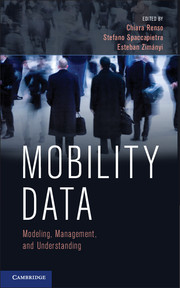Book contents
- Frontmatter
- Contents
- List of Contributors
- Preface
- Acknowledgments
- PART I MOBILITY DATA MODELING AND REPRESENTATION
- 1 Trajectories and Their Representations
- 2 Trajectory Collection and Reconstruction
- 3 Trajectory Databases
- 4 Trajectory Data Warehouses
- 5 Mobility and Uncertainty
- PART II MOBILITY DATA UNDERSTANDING
- PART III MOBILITY APPLICATIONS
- PART IV FUTURE CHALLENGES AND CONCLUSIONS
- Bibliography
- Glossary
- Author Index
- Subject Index
- Plate section
5 - Mobility and Uncertainty
from PART I - MOBILITY DATA MODELING AND REPRESENTATION
Published online by Cambridge University Press: 05 October 2013
- Frontmatter
- Contents
- List of Contributors
- Preface
- Acknowledgments
- PART I MOBILITY DATA MODELING AND REPRESENTATION
- 1 Trajectories and Their Representations
- 2 Trajectory Collection and Reconstruction
- 3 Trajectory Databases
- 4 Trajectory Data Warehouses
- 5 Mobility and Uncertainty
- PART II MOBILITY DATA UNDERSTANDING
- PART III MOBILITY APPLICATIONS
- PART IV FUTURE CHALLENGES AND CONCLUSIONS
- Bibliography
- Glossary
- Author Index
- Subject Index
- Plate section
Summary
Introduction
Mobility data are inherently uncertain due to several contributing factors related to different phases of their life cycle, from acquisition to interpretation. When data are processed, uncertainty propagates to intermediate and final results. Thus, it is important to be aware of uncertainty in trajectory data and explicitly account for it in their modeling and managing. For example, consider a simple scenario where people move around a city and disclose their positions twice an hour; to avoid stalking, the disclosed position is randomly selected from inside a circle with a radius of one kilometer, which contains the position of the user. Not being aware of uncertainty could lead to inconsistent conclusions. For instance, we could erroneously assume that a group of people have met or that someone has visited a privacy-sensitive place. On the contrary, taking uncertainty into account, we can avoid such erroneous conclusions; for example, if someone was farther than one kilometer from the place of an accident, we can certainly assume that this person was not involved in that accident.
We next introduce a well-known taxonomy of uncertainty (see Bibliographic Notes section), aimed at clearly defining terms that are often given multiple meanings in the literature.
A Taxonomy of Uncertainty
The taxonomy we present here considers, at the highest abstraction level, that uncertainty in mobility and geographic information is caused by the complexity of the system conformed by three kinds of entities: human being, earth (i.e., geographic/moving), and computing machinery.
- Type
- Chapter
- Information
- Mobility DataModeling, Management, and Understanding, pp. 83 - 102Publisher: Cambridge University PressPrint publication year: 2013



